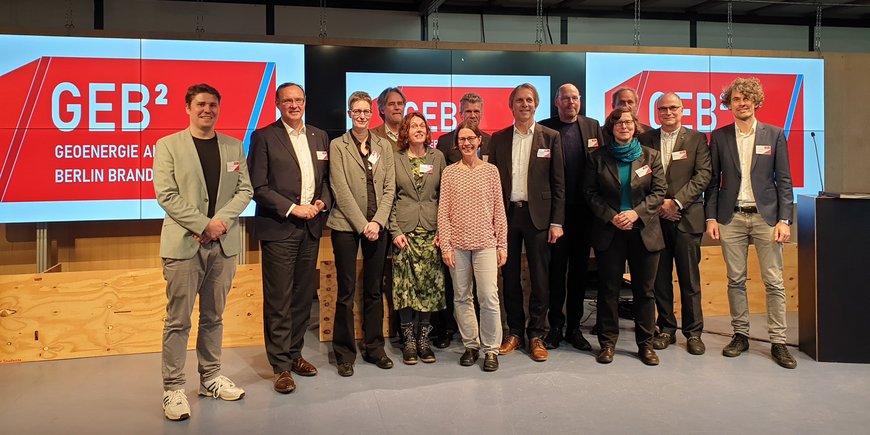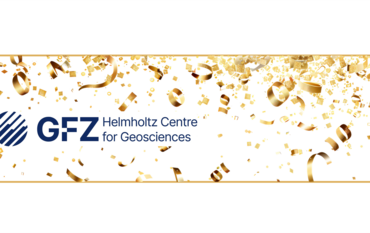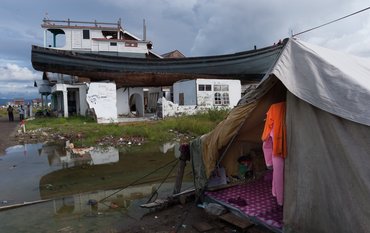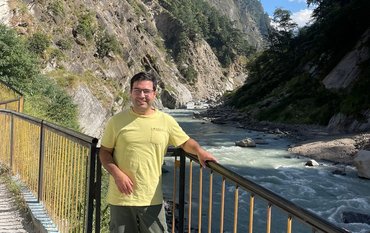Eight partner institutions, including the GFZ German Research Centre for Geosciences and the Fraunhofer IEG, conclude a cooperation agreement to promote a low-CO2 and import-independent energy supply. The alliance publishes a position paper on geoenergy-based heat supply in Berlin and Brandenburg
Joint research projects, demonstration projects and the promotion of young scientists are at the centre of the newly founded Geoenergy Alliance Berlin-Brandenburg (GEB2). Eight partner institutions from science and research have signed a cooperation agreement in Berlin. In a position paper, the Geoenergy Alliance makes it clear that geoenergy is a central component of the energy transition for both the state of Berlin and the state of Brandenburg and proposes implementation steps for utilising the geoenergetic potential.
Utilising the subsurface to generate or store energy is an essential building block for a future energy supply that is low in CO2 and as independent of imports as possible. Geoenergy is more than just geothermal energy, as it also includes the storage of heat and energy sources such as hydrogen underground. There is a great need for research. The aim of the alliance is to close knowledge gaps and advance projects. The alliance facilitates cooperation and access to the latest expertise on relevant issues relating to the development and utilisation of geo-energy applications.
Partners of the Berlin-Brandenburg Geoenergy Alliance
The partners of the Geoenergy Alliance Berlin-Brandenburg are GFZ German Research Centre for Geosciences, Fraunhofer IEG, Technische Universität Berlin, Berlin University of Applied Sciences, Institute for Ecological Economy Research (IÖW), Brandenburg University of Technology Cottbus-Senftenberg, Freie Universität Berlin and the Federal Institute for Materials Research and Testing (BAM). Other institutions, such as the University of Potsdam, are planning to join.
Support from industry and politics
Susanne Buiter, Scientific Director of the GFZ, said at the signing of the agreement:
“The world must become climate-neutral as quickly as possible - and this is only possible with a significantly more intensive use of the geological subsurface for renewable energies. We have seen in Potsdam how quickly geothermal drilling can be realised and I am aware of the great social and political interest in geothermal energy. This makes it all the more important that research institutions and universities in the region are now joining forces.”
Mario Ragwitz, Director of the Fraunhofer IEG, emphasised at the founding event:
“In the alliance, we are pooling the complementary expertise of the partners involved in energy research. This alliance is therefore the ideal point of contact for industry and politics with regard to geoenergy and the contribution of geoenergy to a climate-neutral energy supply. This simplifies access to the latest research findings for political decision-makers and industry representatives. By integrating interdisciplinary expertise, we will enable direct implementation.”
Implementing effective geoenergy projects
Julika Weiß from the Institute for Ecological Economy Research (IÖW) emphasised the role of socio-economic issues in geoenergy research in her speech at the founding event:
“It is important to research the sustainable use of geoenergy and to demonstrate its potential for a rapid and consistent energy transition. The rapid utilisation of geoenergy requires not only the development of the subsurface, but also the development and testing of sustainable and viable utilisation concepts and business models, for example in inter- and transdisciplinary research projects and real-world laboratories.”
David Bruhn, Head of the Competence Centre “Global Georesources” and co-initiator of GEB²:
“The close cooperation between the research institutions in Berlin and Brandenburg will significantly accelerate the realisation of projects in the field of geoenergy. This is because the alliance covers a breadth of technical and socio-economic issues that is rarely possible at a single institute. The response from industry shows that there is a desire for a direct exchange with research. This also facilitates the transfer of current research results to industry.”
Simona Regenspurg, working group leader at the GFZ and private lecturer at the Free University of Berlin and co-initiator of GEB²:
“We want to support industry and politics in implementing many reliable and effective geoenergy projects by minimising uncertainties and risks through joint research.”
Position paper publishe”
A first product of the alliance is the position paper "Regional heat supply through geoenergy in Berlin and Brandenburg – recommendations on the need for research”. The position paper shows that there is considerable potential in the region. In order to tap into this potential, more knowledge about the subsurface, the designation of priority areas and pilot sites, the adaptation of legal and regulatory framework conditions, the expansion of district heating networks and the development of skilled labour are required. The position paper also highlights the existing need for research and outlines how the Alliance would like to contribute to advancing the expansion of geoenergy in Berlin and Brandenburg.
The position paper is available for download (German only):
https://www.gfz.de/sektion/geoenergie/daten-wissenstransfer-netzwerke/geoenergie-allianz-berlin-brandenburg
Scientific Contact
GFZ:
PD Dr. Simona Regenspurg
Head of Working Group „Geothermal Fluids“
Section 4.8 „Geoenergy“
Helmholtz Centre Potsdam
GFZ German Research Centre for Geosciences
Telegrafenberg
14473 Potsdam
Phone: +49 331 6264-1437
Email: simona.regenspurg@gfz-potsdam.de
Fraunhofer IEG:
Prof. Dr. David Bruhn
Head Competence Center „Globale Georessourcen“
Fraunhofer-Einrichtung für Energieinfrastrukturen und Geothermie
Gulbener Straße 23
03046 Cottbus
Phone: +49 355 35540-400
Email: david.bruhn@ieg.fraunhofer.de







![[Translate to English:] Fire in a forest, smoke rising, aerial view from above](/fileadmin/_processed_/8/3/csm_2025_01_06_AdobeStock_415831729_5a0e6d50d3.jpeg)









![[Translate to English:] [Translate to English:] Abror Gafurov von dem Schriftzug "Welcome to Azerbaijan" und den UN und COP Logos](/fileadmin/_processed_/2/5/csm_2024_11_Baku_COP29_Abror_Gafurov_1042faec82.jpeg)


![[Translate to English:] Martin Herold standing in front of the library on the Telegrafenberg](/fileadmin/_processed_/c/d/csm_Martin_Herold_d385ee4dd9.jpeg)
![[Translate to English:] Many people are listening to a presentation in the GFZ lecture hall.](/fileadmin/_processed_/c/a/csm_1_Bild1_hell_b9c0e9f5ed.jpeg)






![[Translate to English:] Both scientists sitting on stools in front of a wall of books in the Telegrafenberg library](/fileadmin/_processed_/6/6/csm_Buiter_Castell_DORA_4_e87cb1ea18.jpeg)
![[Translate to English:] Gruppenbild mit 4 Personen](/fileadmin/_processed_/8/d/csm_20241017_GFZ-Emmerman-Medal-005_web_reinhardtundsommer_21a414fa4a.jpeg)






![[Translate to English:] Ice landscape with five red tents](/fileadmin/_processed_/8/9/csm_Zeltlager_auf_dem_Eis_Urheberin_Jenine_McCutcheon_5ced2d523b.jpeg)